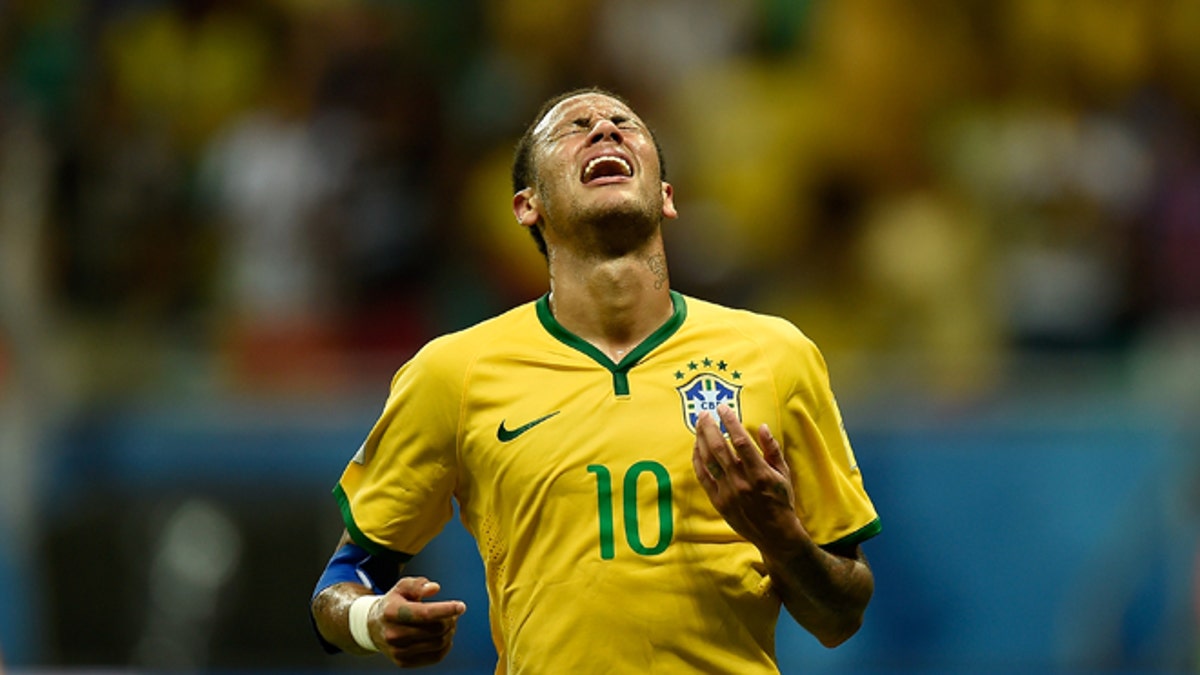
SALVADOR, BRAZIL - NOVEMBER 17: Neymar of Brazil reacts during a match between Brazil and Peru as part of 2018 FIFA World Cup Russia Qualifiers at Arena Fonte Nova on November 17, 2015 in Salvador, Brazil. (Photo by Buda Mendes/Getty Images) (2015 Getty Images)
Rio de Janeiro – There’s a word in Portuguese, “saudade,” which is impossible to translate into English. It carries a notion of nostalgia, of a joy that’s wrapped up in sadness.
In Brazil in 2016, there is no better word than saudade to describe how citizens feel about their once-beloved national men’s soccer team.
Henrique Neto, 60, a retired accountant, remembers sitting on the floor of Rio’s Santos Dumont Airport and watching Brazil, the host nation, be destroyed 7-1 by Germany in the semifinal of the World Cup two years ago.
Neto could only repeat to himself, "The dream is over. The dream is over."
His sense of disillusionment with the Brazilian football team, nicknamed The Seleção ("The Selection"), seems to be shared with the entire population of the country.
The team's early exit in the Copa América Centenario earlier this summer, without even making it to the second round, buried the notion of a quick recovery and dashed hopes of challenging for the next World Cup in Russia.
The biggest soccer power in the world, with five Cups and countless other titles to its credit, has never won an Olympic soccer gold medal. And hosting the Games may not provide much of a benefit as, this time, the Seleção may find that the mood of the fans is more demanding than supportive.
"Brazilians see soccer as an art,” says sports commentator André Rizek, “and we are only satisfied with the Selecão when it wins or when it plays the jogo bonito [“the beautiful game”] – which has not been the case for a long time.”
Giselle Figueiredo, a carioca – as Rio resident are known – echoes the sentiment: an avid soccer fan, she says that the Selecão “lost the magic” at the 2014 Cup.
"We will cheer in the Olympics, and there is always a feeling that Brazil could go back to being what it once was, but now I prefer to watch my national team, Flamengo, play," she told Fox News Latino.
Rizek suspects it may be more of an international phenomenon than just something afflicting Brazilians. Part of the problem, he suggests, is that top national talents leave while very young to play in European countries, which prevents them from forming a bond with local fans.
"The classic example would be [Lionel] Messi, who has never played in Argentina," Rizek said.
Corruption involving the Brazilian Football Confederation (CBF) has been used as an argument in the press to explain the unpopularity of the Selecão, but Rizek is skeptical.
"The CBF has been corrupt for a long time, and, while we were winning, no one complained. The problem is that people have seen increasingly better football in European clubs and are feeling less connection with the national teams," he said.
Another carioca, Renata Oliveira, believes in the national motto, "Brazilians never give up!" but she does so, she says, with her eyes very much open.
"Hope is the last thing to die,” Oliveira told FNL. “I cheer very hard [for the national team], but understanding the reality. In the past, we entered the field knowing we were going to win. Now, we go with faith – but also distrust."
